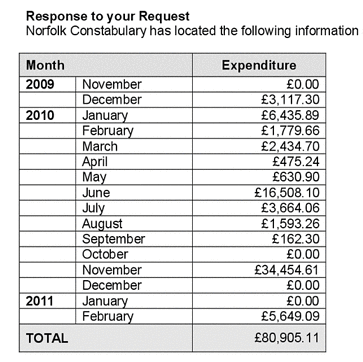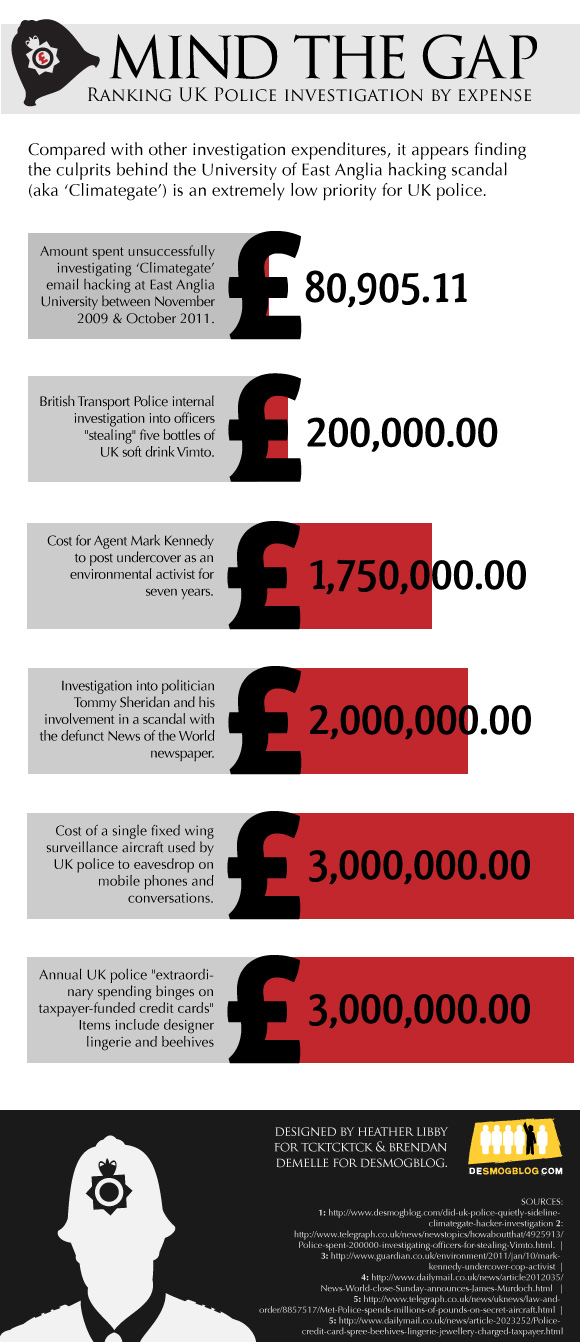The UK police force tasked with investigating the hacking of emails and documents from the Climatic Research Unit at the University of East Anglia (the debunked “Climategate”) seems to have quietly de-prioritized its investigation earlier this year, according to documents released under the UK Freedom of Information Act (FOIA).
The Norfolk Constabulary police force’s responses to FOIA requests indicate that the amount spent on attempts to identify the hacker in the last year was just £5,649.09 – with all but £80.05 spent on invoices for work carried out previously by private companies, suggesting police work on the investigation has ground to a halt.
Earlier this week, the hackers (ironically calling themselves “FOIA”) illegally released a second set of hacked material consisting of 5,349 emails and 23 documents from UEA. The university and independent reviews suggest these are leftovers from the initial November 2009 theft – in the words of one climate scientist, “two-year old turkey.”
While nine independent inquiries have cleared the scientists of any wrongdoing in the wake of the baseless ‘Climategate’ episode, the person (or persons) responsible for the hacking has gotten off scot-free to date. The FOIA documents seem to indicate that the police investigation was derailed and perhaps dropped earlier this year.
The grand total spent by Norfolk police on the UEA hacker investigation since the November 2009 theft is just £80,905.11.
To illustrate the vast gap between this figure and the expenditures reported publicly about other UK police investigations, see the infographic below.
Norfolk Constabulary invoked an exemption under the FOIA rules to refuse to confirm or deny whether other UK security services such as MI5 or MI6 have worked on the investigation. A statement from Norfolk police did confirm it is receiving “ongoing assistance” from the UK’s domestic terrorism agency, the National Domestic Extremism Coordination Unit, and that it was helped early in the investigation by London’s Metropolitan Police. But the current status of their involvement – and how high a priority this investigation is for these agencies – is unclear.
While the Guardian reports that police say the latest leak could produce more leads and claim their investigation is ongoing, the FOIA documents show that the last time any money was actually spent on this case was in February 2011, when the £80.05 in “officer expenses” were filed.
In response to the publication of the tiny £5,649.09 annual expenditure, a Norfolk police spokeswoman told the Guardian it is “relevant to note that the figures relate only to additional expenditure and do not include officer and staff time on the investigation, which is not routinely recorded.”
It is entirely plausible that British security agencies have spent millions and are poised to make an arrest. But the budget certainly indicates that it hasn’t been a high priority for the Norfolk police force.
If there is a serious investigation underway, surely the officers would incur more expenses than the cost of a few boxes of paper and doughnuts?
One FOIA response from the Norfolk Constabulary in September 2011 was particularly troubling, and it doesn’t exactly square with the police force’s statement to the Guardian this week:
“There are currently no police officers or police staff, within Norfolk Constabulary, working full time on the investigation into the acquisition of data from the computers at the University of East Anglia Climatic Research Unit. The Senior Investigating Officer (SIO) and the Deputy/SIO retain responsibility and resources are allocated if and when necessary.”
There is a vital public interest in confirming that the UEA emails were criminally hacked and in turn, identifying those responsible and their connections.
Among many reasons for continued police diligence, climate scientist Phil Jones said he contemplated suicide after the initial email theft in 2009. So it is important for investigators to get to the bottom of this crime in order to mete out at least some justice for this baseless attempt at character assassination of climate scientists.
The ongoing harassment of climate scientists – including death threats in several cases – cannot be ignored by law enforcement agencies. If police were able to confirm the identity of the UEA hackers and bring them to justice swiftly, it would hopefully have a chilling effect on the vicious smear campaign against climate scientists.
If in fact there is a robust police investigation ongoing, then the public needs to have confirmation about that. Investigators can provide some indications of their progress without compromising the investigation, and they owe at least that courtesy to the public.
As it stands now, these FOIA results showing very little expenditure on the investigation indicate that the Norfolk police effort is completely inadequate.
If the investigation was sidelined for much of 2011, as the FOIA documents indicate, then a formal review must commence immediately to determine the reasons for that lapse in judgment.
British officials should also seriously consider the suggestion from Massachusetts Democratic Congressman Edward Markey that the U.S. intelligence community should assist in the investigation.
Markey explained the significance of this investigation in a statement:
“This is clearly an attempt to sabotage the international climate talks for a second time, and there has not been enough attention paid to who is responsible for these illegal acts. If this happened surrounding nuclear arms talks, we would have the full force of the western world’s intelligence community pursuing the perpetrators. And yet, with the stability of our climate hanging in the balance with these international climate treaty negotiations, these hackers and their supporters are still on the loose. It is time to bring them to justice.”
Whatever the reason for the low UK police expenditures, it is clearly time for a more coordinated international investigation into this crime.
View the FOIA documents: [1][2][3][4][5][6][7][8][9][10][11][12][13][14][15]
Image credit: Richard Peterson/Shutterstock
Subscribe to our newsletter
Stay up to date with DeSmog news and alerts









